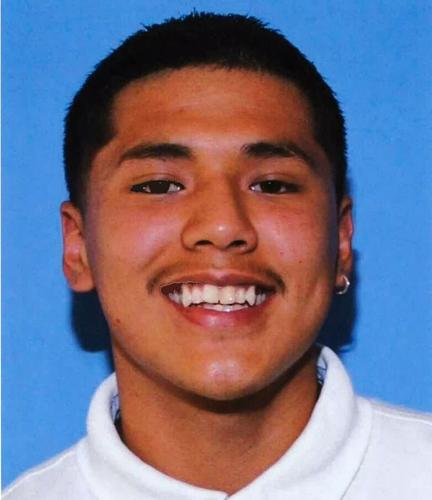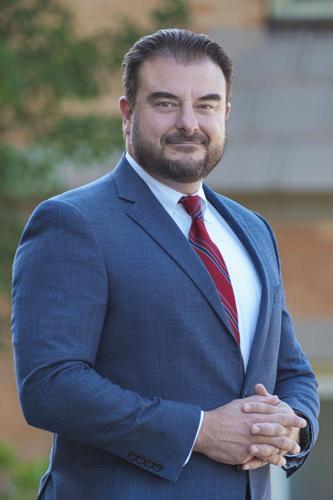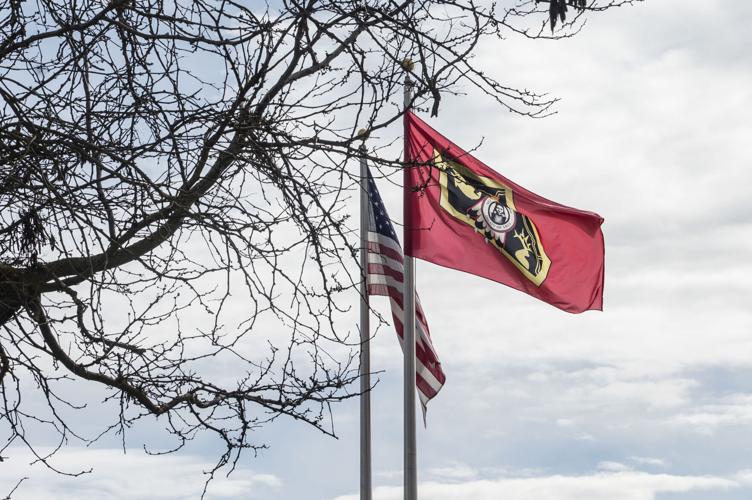Zachary Holt left the Nez Perce Reservation in September 2022 and set off on a drug-fueled crime spree that took him and an accomplice across the reservation and further north into Idaho.ŌĆ»┬Ā┬Ā

Zachary Holt (Confederated Tribes of the Colville Reservation)
Six weeks and 200 hundred miles later,┬ĀHolt and his accomplice ŌĆö a non-Native man named Dezmonique┬ĀTenzsley ŌĆö ended their string of robberies, assaults, shootings and home invasions on eastern Washington's Colville Indian Reservation, according┬Āto the region's┬Ā.╠²╠²
People are also reading…
There, HoltŌĆÖs brother, Curry Pinkham, drove Holt and Tenzsley to a trailer where they donned masks, burst into a trailer and murdered two strangers: siblings Gale and Jeremy Neal,┬Āaccording to the┬Ā.╠²╠²┬Ā
As Holt, Tenzsley and Pinkham fled the scene of that crime, Holt committed yet another crime. He shot at two tribal police officers, injuring one,┬Ācourt documents say.╠²╠²
But all that mayhem and death couldŌĆÖve been prevented, according to former Nez Perce Police Officer Kevin Brown, if Holt had been held fully accountable for another crime ŌĆö a brutal ax attack against his one of his other brothers ŌĆö that occurred 18 months earlier.ŌĆ»ŌĆ»┬Ā
ŌĆ£In my years of doing this, this is┬Āthe first time that I can actually pinpoint to a time where if somebody had done what they were supposed to have done, either on the law enforcement side or the prosecutorial side,ŌĆØ Brown said, ŌĆ£this person would not have been able to commit the crime that he just got convicted of.ŌĆØ┬Ā
A Lee Enterprises Public Service Journalism Team investigation found that Brown is not alone in alleging that the law hasnŌĆÖt always been enforced adequately or fairly on the Nez Perce Reservation of central Idaho, allowing some criminals to reoffend with devastating ŌĆö and even deadly ŌĆö consequences.ŌĆ»┬Ā
Numerous former tribal police┬Āofficers, the former head of the Nez Perce justice system and various tribal residents make similar allegations.ŌĆ»ŌĆ»┬Ā

Neighbors identified this property at 303 Mountain Ridge Homes Road in Keller, Wash., as the location where two bodies were found by police following a reported shooting on Oct. 20, 2022.┬Ā
Concerns about the tribal police are pervasive and long-standing. In May 2022, the Nez Tribe's General Council, which includes all enrolled Nez Perce citizens over age 18, gave the department a vote of no confidence.ŌĆ»
Channa Henry, a former tribal police officer who spent years pushing within and outside the tribe for reform, introduced that resolution due to her concerns about "cases going unsolved and not prosecuted" as well as the department's conflicting and inconsistently applied policies, she said.
But claims of misconduct by the Nez Perce Tribal Police are not simply accusations.ŌĆ»
Last year, a Bureau of Indian Affairs investigation found that top tribal law-enforcement officials engaged in misconduct, including ŌĆ£retaliation/reprisal, the willful or negligent making of an untruthful statement of any kind in any written or oral report pertaining to an officerŌĆÖs official duties and dereliction of duty.ŌĆØŌĆ»
Those three former employees were not just any employees. They were:ŌĆ»
- Harold Scott, who served as police chief from 2016 until 2023;
- Daniel Taylor, who served as the departmentŌĆÖs criminal investigator, a powerful position that involves leading investigations and working closely with the FBI on major crimes that are to be handled in the federal justice system, until 2024;
- and Leotis McCormack, who served as police captain until 2024.
The Lee Enterprises Public Service Journalism Team made a Freedom of Information Act request in September for all BIA investigations into the Nez Perce Tribal Police Department conducted between Jan. 1, 2020 and Sept. 2024. The BIA did not respond for nearly a year, until after this series began publishing last week.
That response came from Charles Taylor, acting Internal Affairs Division chief for the BIAŌĆÖs Office of Justice Services. Taylor wrote that his office identified eight responsive records but would not provide them.
ŌĆ£The Agency has considered the responsive records and determined that the individual privacy interest in these records outweighs the public interest,ŌĆØ Taylor wrote. ŌĆ£Therefore, we are withholding all 8 records in full.ŌĆØ
But the memo from Kenton Beckstead, the then-head of the tribeŌĆÖs Law and Order Executive Office, said the misconduct identified by the BIA included ŌĆ£retaliation/reprisal, the willful or negligent making of an untruthful statement of any kind in any written or oral report pertaining to an officerŌĆÖs official duties, and dereliction of duty.ŌĆØ
In an interview with Lee Enterprises, Beckstead described the contents of that BIA investigation. He said it resultedfrom"complaints of deficiencies in operations and investigations" within the Nez Perce police. Beckstead said the bureau's findings were focused on how Scott, Taylor and McCormack violated BIA policies through various actions.
In response to questions about the BIA investigation, claims of misconduct within the police department and the handling of specific violent crimes on the reservation, Rachel E. Wilson, the tribeŌĆÖs communication manager, provided an ŌĆ£official responseŌĆØ on behalf of the Nez Perce Tribe.
Wilson wrote that the tribe is ŌĆ£limited in our ability to comment on certain matters,ŌĆØ but that the tribe ŌĆ£is dedicated to maintaining the highest level of law enforcement to serve and protect all citizens on the Nez Perce Reservation.ŌĆØ

The Clearwater River runs through Kamiah, Idaho, on Saturday, Feb. 22.┬Ā
ŌĆśViolent actsŌĆÖ┬Ā
It was the middle of the night in early 2021 when Kevin Brown was called to the scene of a grizzly crime in Lapwai on the Nez Perce Reservation.ŌĆ» He found something he canŌĆÖt forget.ŌĆ»┬Ā
ŌĆ£I had brain matter and skull particles on the ground,ŌĆØ said Brown, who then worked as a patrol officer for the Nez Perce Tribal Police and is now an officer in Louisiana. ŌĆ£This was like two o'clock in the morning.ŌĆØ┬Ā
The suspect, Brown said, was Zachary Holt.ŌĆ»┬Ā
The victim was HoltŌĆÖs own brother.ŌĆ»┬Ā

Kevin Brown, photographed during his time as a Nez Perce patrol officer, said he saw┬ĀŌĆ£huge red flagsŌĆØ in the way justice was being meted out on the tribeŌĆÖs reservation in central Idaho.
Zach Holt was arrested, Brown said, on suspicion that he had attacked his brother with an ax, striking him in the head.ŌĆ»┬Ā
Marcus Horton, another former tribal officer who is now an Lewis County sheriffŌĆÖs deputy, said he too responded to this call, in which Holt ŌĆ£went after (his brother) with an ax and almost gave him a frontal lobotomy.ŌĆØŌĆ»ŌĆ»┬Ā
Holt was well known to law enforcement, Horton and other officers said.ŌĆ»┬Ā
Court documents from his murder trial indicate Holt repeatedly ŌĆ£engaged in violent acts over the course of his life: causing the death of an individual during a robbery in Asotin County while a juvenile, striking his brother in the head with an ax, and strangling his cellmate in the Yakima County Jail.ŌĆØŌĆ»┬Ā
Efforts to reach Zach Holt were unsuccessful, but David Partovi, who was his defense attorney during his murder trial this year, offered insight into his clientŌĆÖs criminal record.ŌĆ»┬Ā
Reading from a presentence investigation report, Partovi said that HoltŌĆÖs criminal history began in 2015, when a then 15-year-old Holt was convicted of first-degree robbery in Washington state and sentenced to four to five years in juvenile custody.ŌĆ»┬Ā┬Ā
Beginning soon after he was released in August 2019 and continuing into early 2021, Holt was picked up on a number of charges, including driving under the influence, residential burglary, dispensing alcohol to a minor, rape and battery, Partovi said.ŌĆ»┬Ā
ŌĆ£A lot of them were dismissed,ŌĆØ Partovi said. ŌĆ£A lot of them he was convicted of. But the convictions are all Nez Perce tribal type (offenses), drug- and alcohol-related.ŌĆØŌĆ»┬Ā

Flags fly outside the Nez Perce Tribal Executive Committee office on Saturday, Feb. 22, in Lapwai, Idaho.
ŌĆśGrave conditionŌĆÖ┬Ā
Horton said he saw a pattern of Holt not being held accountable.ŌĆ»┬Ā
He recalled arresting him multiple times, and the ŌĆ£next thing you know ŌĆö next day, two days laterŌĆØ ŌĆö heŌĆÖd be back on the street.ŌĆ»┬Ā
But when he and Brown responded to HoltŌĆÖs alleged attack against his brother, they thought it might mean Holt would be charged with a more serious crime ŌĆö one that would be handled in the federal, rather than tribal, justice system.ŌĆ»┬Ā┬Ā
The federal Major Crimes Act specifies which crimes on tribal lands are to be investigated by federal agents and tried in federal courts. And one of those crimes, Brown said, is attempted murder.ŌĆ»┬Ā
ŌĆ£It was attempted murder,ŌĆØ Brown said. ŌĆ£There was no other way to put it. There's no other way to describe that scene other than aggravated attempted murder. That's it. That was the only thing that you could do. He (HoltŌĆÖs brother) was admitted to the hospital in grave┬Ācondition. That's what all the doctors' reports said.┬Ā
ŌĆ£It was the epitome of the Major Crimes Act,ŌĆØ Brown said. ŌĆ£That should have went federal.ŌĆØŌĆ»┬Ā
Partovi said Zach HoltŌĆÖs victim ŌĆö his brother ŌĆö agreed.ŌĆ»┬Ā
Brown and Partovi disagree, however, about who was to blame for federal prosecutors not pursuing the case.ŌĆ»┬Ā
Brown believes it was Taylor, the tribal criminal investigator found by the BIA to have engaged in misconduct, who failed to turn the crime over to the FBI.ŌĆ»┬Ā
Partovi, on the other hand, believes it was the Assistant U.S. Attorney for Idaho, Traci Whelan, who declined to take up the case.ŌĆ»┬Ā

Partovi
Partovi said he ŌĆ£read a letterŌĆØ┬Āthat HoltŌĆÖs brother wrote to the judge overseeing Zach HoltŌĆÖs murder trial that ŌĆ£said something to the effect thatŌĆØ the Assistant U.S. Attorney for Idaho, Traci Whelan ŌĆ£had some responsibility for the murders that Zach Holt got convicted of committing because she didn't prosecute Zach for his assaultŌĆØ on him.ŌĆ»┬Ā
When asked about such a letter, Whelan said, ŌĆ£I have never seen a letter like that.ŌĆØŌĆ»┬Ā
Whelan declined to comment further.ŌĆ»┬Ā
ŌĆ£I asked her about that one time,ŌĆØ Partovi said of WhelanŌĆÖs decision not to charge Holt in federal court. ŌĆ£And she told me that at least part of the reason that they declined to prosecute Zach for the assault on (his brother) was because there was going to be some level of self-defense claim that she thought was credible enough that it would have made the prosecution problematic, whatever that means. And so that was the reason that they had declined to prosecute Zach for attacking (his brother).ŌĆØŌĆ»┬Ā
While it was not pursued in federal court, prosecutors pursued lesser charges against Holt in tribal court.ŌĆ»┬Ā
Reading from the presentence investigation report compiled as part of his murder trial, Partovi said that it appeared Nez Perce police detained Holt on Feb. 24, 2021, on a range of charges, including domestic aggravated battery, likely for the attack on his brother, though the document did not offer specifics.ŌĆ»
Just less than a year later, on Jan. 3, 2022, Partovi said, Holt pled guilty to ŌĆ£a pile of pending cases,ŌĆØ including the aggravated battery charge, and was banished from the Nez Perce Reservation for five years.ŌĆ»┬Ā
While documents did not explicitly say whether Holt was incarcerated between his arrest and his plea, Partovi said it was ŌĆ£very, very possibleŌĆØ that he spent that time in tribal jail.ŌĆ»┬Ā
Brown said he, too, believed that Holt spent just less than a year in the tribal jail for the alleged ax attack, before receiving a five-year banishment from the Nez Perce reservation upon his release.ŌĆ»┬Ā
Beckstead, the tribeŌĆÖs former Law and Order Executive Officer, agreed that Holt ŌĆ£could have been held accountable better. But I don't know that it's fair to blame the police for that.ŌĆØŌĆ»┬Ā
The ŌĆ£bigger issue,ŌĆØ he said, was that the tribe had not yet adopted the Tribal Law and Order Act, a federal law that allows tribes to impose sentences for longer than the one-year limit that otherwise exists on reservations.ŌĆ»┬Ā
So while the ax attack was ŌĆ£a provable case,ŌĆØ the Nez Perce tribal court ŌĆ£could only punish for up to a year, because we hadn't implemented enhanced sentencing,ŌĆØ Beckstead said.ŌĆ»┬Ā
And since ŌĆ£Indian Country's ruled by this system we have set up of the feds having to decide to charge stuff when it's super serious,ŌĆØ Holt fell through the cracks of an inefficient jurisdictional system on tribal land, Beckstead said.ŌĆ»┬Ā
Wilson, the Nez Perce TribeŌĆÖs communication manager, said the tribal police department ŌĆ£remains firmly committed to the safety and well-being of our community.ŌĆØ┬Ā
ŌĆ£While acknowledging that past incidents may have involved missteps or misunderstandings, it is our priority to learn, evolve, and move forward with integrity and accountability,ŌĆØ Wilson wrote.ŌĆ»┬Ā
ŌĆ£Under the leadership of Chief Mark Bensen,ŌĆØ she added, ŌĆ£the department is undergoing significant improvements to uphold the highest standards of conduct and professionalism. The change in our police command staff, increased training and mentorship for our officers has greatly improved the overall operations of the department.ŌĆØ┬Ā
Wilson also pushed back on Lee EnterprisesŌĆÖ reporting, writing, ŌĆ£Many of the questions provided contain unverified statements, allegations, suppositions, or anecdotes without any supporting evidence.ŌĆØŌĆ»┬Ā
McCormack and Taylor did not respond to questions for this story, but Matthew Lovell, an attorney, replied on their behalf.ŌĆ»┬Ā
Lovell said he is representing both men in ŌĆ£ongoing litigation with the Nez Perce Tribe and the Bureau of Indian AffairsŌĆØ and declined to comment further.ŌĆ»┬Ā
Efforts to reach Scott were not successful.ŌĆ»┬Ā
A BIA spokesperson answered some questions about its procedures for investigating and overseeing tribal police but said the bureau ŌĆ£does not comment on how a tribe handles justice, as long as they follow their own rules and federal agreements.ŌĆØ┬Ā
ŌĆśSidestepping the lawŌĆÖ┬Ā
Holt and Tensley were convicted of the murders of the Gale siblings, as well as numerous other felonies, and sentenced to life in prison in February.ŌĆ»┬Ā

Tawni LaPlante believes Zach Holt's murder of her mother, Gale Neal, "could have been prevented."┬Ā
But Ray Neal, the victimsŌĆÖ brother, and Tawni LaPlante, GaleŌĆÖs daughter, both believe the justice system failed to stop Holt when he exhibited violent behavior before he committed murder.┬Ā
LaPlante believes her motherŌĆÖs death ŌĆ£could have been prevented.ŌĆØ ┬Ā┬Ā
ŌĆ£ThereŌĆÖs no reason he shouldŌĆÖve been out of jailŌĆØ at the time of the murder, LaPlante said.┬Ā
Neal thinks Holt could and should┬Āhave been ŌĆ£dealt withŌĆØ long before Holt killed them.ŌĆ»┬Ā

Ray Neal, photographed Jan. 30, 2025, believes Zachary Holt might not have murdered Neal's brother and sister in 2022 if he'd┬Ābeen held more accountable beforehand.┬Ā
ŌĆ£Because that wasn't the first time he displayed to the world who he was,ŌĆØ Neal said. ŌĆ£He just got more carefree with it because he got away with it so easily. If he didn't so easily get away with these crimes that built up to the horrific thing he did that day, he wouldn't have been able to get to that point.ŌĆØ┬Ā
ŌĆ£Somehow he was sidestepping the law or jumping over, or I don't know if he knew the right people,ŌĆØ Neal added. ŌĆ£But the crimes that he was committing were at the level of things that should have put him in prison far before this ŌĆö before he got to that point.ŌĆØŌĆ»┬Ā


























